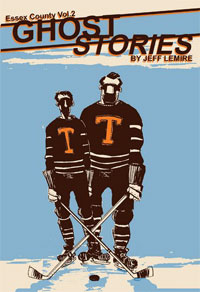Essex County Vol. 2: Ghost Stories
By Zak Edwards
February 25, 2008 - 13:48
Top Shelf Productions
Writer(s): Jeff Lemire
Penciller(s): Jeff Lemire
Inker(s): Jeff Lemire
Cover Artist(s): Jeff Lemire
One of the great things about the graphic novel industry is that it is still very young relative to many other forms of medium. Sure, the basic format of a comic book can be traced back to Egyptian hieroglyphics, but graphic novels are still an exciting medium to be around. They are fast outgrowing the old style of super-hero, science-fiction romances, replacing lances or six-shooters with heat vision and armour with capes, and are instead creating works demanding respect and attention. A comic book can be taken seriously and be considered a work of literature. Perhaps this concept existed during the eighties, with “Watchmen” and many others, and also with Will Eisner’s landmark “A Contract with God,” but they are coming back to this idea of ‘graphic literature.’ Works like Jeff Lemire’s “Essex County” series are joining this trend, giving a renewed sense of credibility to the comic book.
 |
Jeff Lemire is well-read and familiar with literature and this graphic novel seeks to continue this tradition. But Lemire is not attempting to create a novel in a graphic format, rather, he is successfully utilizing the unique benefits of the graphic novel medium to tell his story of Lou LeBeuf. Lemire’s influences are evident, like Kurt Vonnegut’s “Slaughter-House Five.” The narration follows a similar displacement of time narration style, confusing the protagonist and removing him from the present while simultaneously shaking the reader’s faith in his recollection of his past. Lou cannot remember if his mother’s funeral was in the spring or winter and the artwork changes to accommodate his confusion. He constantly has ‘moments of clarity’ only to have his revelations contested by himself. At the beginning of the story Lou questions where Beth, his wife, is only to remember that he was never married. Beth is an integral part of his life, causing much of his isolation and self-imposed exile, but is his brother’s wife whom he destroys his life with in a single night. Despite his selfishness and self-focus, Lemire allows parallels the similar feelings felt by both Lou and his brother Vince. Both are incomplete without each other, lonely in a way.
Lou’s hearing is representative of his forced isolation from his family and world around him so that by the time he is an old man he can simply not look at someone to separate himself from the interaction. He barely talks even though he can be seen thinking much. His passiveness eventually takes him back to his home and his family, but only after factors are removed. He meets Vince after twenty-five years of silence to carry his mother’s coffin. Then again to bury Vince’s family. After Vince dies, Lou is eventually taken to a retirement home, where he tries very hard to keep to himself. Vince does eventually take steps in his life to become happy, taking a job at a rink, coaching a kids hockey team, even playing cards at the retirement home. But all of this is lost again as he runs away back to the farm, back home. But Lemire leaves us with two final images for Lou’s life, the last words being “alone again” and the final look at Lou is him smiling. The sincerity of his happiness can be questioned, the presence of the bird can suggest a moment of clarity, a final sincerity in an emotional and uncompromising graphic novel.
Jeff Lemire has created a work of fiction that should be considered a great piece in the Canadian literary experience. The graphic novel industry can only benefit from works like this broadening the horizons of what a comic book can accomplish.
Related Articles:
Jeff Lemire's Essex County Volume 3: The Country Nurse
Essex County's Jeff Lemire Wins Shuster
Essex County Vol. 2: Ghost Stories
Jeff Lemire's Essex County Volume 2: Ghost Stories
Essex County Volume 1: Tales from the Farm
